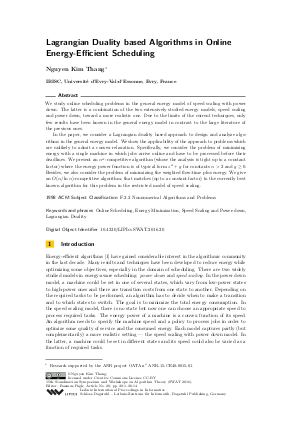Lagrangian Duality based Algorithms in Online Energy-Efficient Scheduling
Author Nguyen Kim Thang
-
Part of:
Volume:
15th Scandinavian Symposium and Workshops on Algorithm Theory (SWAT 2016)
Part of: Series: Leibniz International Proceedings in Informatics (LIPIcs)
Part of: Conference: Scandinavian Symposium and Workshops on Algorithm Theory (SWAT) - License:
 Creative Commons Attribution 3.0 Unported license
Creative Commons Attribution 3.0 Unported license
- Publication Date: 2016-06-22
File

PDF
LIPIcs.SWAT.2016.20.pdf
- Filesize: 404 kB
- 14 pages
Document Identifiers
Subject Classification
Keywords
- Online Scheduling
- Energy Minimization
- Speed Scaling and Power-down
- Lagrangian Duality
Metrics
- Access Statistics
-
Total Accesses (updated on a weekly basis)
0PDF Downloads0Metadata Views
Abstract
We study online scheduling problems in the general energy model of speed scaling with power down. The latter is a combination of the two extensively studied energy models, speed scaling and power down, toward a more realistic one. Due to the limits of the current techniques, only few results have been known in the general energy model in contrast to the large literature of the previous ones. In the paper, we consider a Lagrangian duality based approach to design and analyze algorithms in the general energy model. We show the applicability of the approach to problems which are unlikely to admit a convex relaxation. Specifically, we consider the problem of minimizing energy with a single machine in which jobs arrive online and have to be processed before their deadlines. We present an alpha^alpha-competitive algorithm (whose the analysis is tight up to a constant factor) where the energy power function is of typical form z^alpha + g for constants alpha > 2 and g non-negative. Besides, we also consider the problem of minimizing the weighted flow-time plus energy. We give an O(alpha/ln(alpha))-competitive algorithm; that matches (up to a constant factor) to the currently best known algorithm for this problem in the restricted model of speed scaling.
Cite As Get BibTex
Nguyen Kim Thang. Lagrangian Duality based Algorithms in Online Energy-Efficient Scheduling. In 15th Scandinavian Symposium and Workshops on Algorithm Theory (SWAT 2016). Leibniz International Proceedings in Informatics (LIPIcs), Volume 53, pp. 20:1-20:14, Schloss Dagstuhl – Leibniz-Zentrum für Informatik (2016)
https://doi.org/10.4230/LIPIcs.SWAT.2016.20
BibTex
@InProceedings{kimthang:LIPIcs.SWAT.2016.20,
author = {Kim Thang, Nguyen},
title = {{Lagrangian Duality based Algorithms in Online Energy-Efficient Scheduling}},
booktitle = {15th Scandinavian Symposium and Workshops on Algorithm Theory (SWAT 2016)},
pages = {20:1--20:14},
series = {Leibniz International Proceedings in Informatics (LIPIcs)},
ISBN = {978-3-95977-011-8},
ISSN = {1868-8969},
year = {2016},
volume = {53},
editor = {Pagh, Rasmus},
publisher = {Schloss Dagstuhl -- Leibniz-Zentrum f{\"u}r Informatik},
address = {Dagstuhl, Germany},
URL = {https://drops.dagstuhl.de/entities/document/10.4230/LIPIcs.SWAT.2016.20},
URN = {urn:nbn:de:0030-drops-60427},
doi = {10.4230/LIPIcs.SWAT.2016.20},
annote = {Keywords: Online Scheduling, Energy Minimization, Speed Scaling and Power-down, Lagrangian Duality}
}
Author Details
References
-
Susanne Albers. Energy-efficient algorithms. Commun. ACM, 53(5):86-96, 2010.

-
Susanne Albers and Antonios Antoniadis. Race to idle: new algorithms for speed scaling with a sleep state. ACM Transactions on Algorithms (TALG), 10(2):9, 2014.

-
S. Anand, Naveen Garg, and Amit Kumar. Resource augmentation for weighted flow-time explained by dual fitting. In Proc. 23rd ACM-SIAM Symposium on Discrete Algorithms, pages 1228-1241, 2012.

-
Spyros Angelopoulos, Giorgio Lucarelli, and Kim Thang Nguyen. Primal-dual and dual-fitting analysis of online scheduling algorithms for generalized flow time problems. In Proc. 23rd European Symposium of Algorithms (ESA), pages 35-46. Springer, 2015.

-
Antonios Antoniadis, Chien-Chung Huang, and Sebastian Ott. A fully polynomial-time approximation scheme for speed scaling with sleep state. In Proceedings of the Twenty-Sixth Annual ACM-SIAM Symposium on Discrete Algorithms, pages 1102-1113. SIAM, 2015.

-
Yossi Azar, Nikhil R. Devanur, Zhiyi Huang, and Debmalya Panigrahi. Speed scaling in the non-clairvoyant model. In Proc. 27th ACM on Symposium on Parallelism in Algorithms and Architectures, pages 133-142, 2015.

-
Evripidis Bampis, Christoph Dürr, Fadi Kacem, and Ioannis Milis. Speed scaling with power down scheduling for agreeable deadlines. Sustainable Computing: Informatics and Systems, 2(4):184-189, 2012.

-
Nikhil Bansal, Ho-Leung Chan, Dmitriy Katz, and Kirk Pruhs. Improved bounds for speed scaling in devices obeying the cube-root rule. Theory of Computing, 8(1):209-229, 2012.

-
Nikhil Bansal, Ho-Leung Chan, and Kirk Pruhs. Speed scaling with an arbitrary power function. In Proc. 20th ACM-SIAM Symposium on Discrete Algorithms, pages 693-701, 2009.

-
Nikhil Bansal, Tracy Kimbrel, and Kirk Pruhs. Speed scaling to manage energy and temperature. J. ACM, 54(1), 2007.

-
Nikhil R. Devanur and Zhiyi Huang. Primal dual gives almost optimal energy efficient online algorithms. In Proc. 25th ACM-SIAM Symposium on Discrete Algorithms, 2014.

-
Anupam Gupta, Ravishankar Krishnaswamy, and Kirk Pruhs. Online primal-dual for non-linear optimization with applications to speed scaling. In Proc. 10th Workshop on Approximation and Online Algorithms, pages 173-186, 2012.

-
Xin Han, Tak Wah Lam, Lap-Kei Lee, Isaac Kar-Keung To, and Prudence W. H. Wong. Deadline scheduling and power management for speed bounded processors. Theor. Comput. Sci., 411(40-42):3587-3600, 2010.

-
Sungjin Im, Janardhan Kulkarni, and Kamesh Munagala. Competitive algorithms from competitive equilibria: Non-clairvoyant scheduling under polyhedral constraints. In STOC, 2014.

-
Sungjin Im, Janardhan Kulkarni, Kamesh Munagala, and Kirk Pruhs. Selfishmigrate: A scalable algorithm for non-clairvoyantly scheduling heterogeneous processors. In Proc. 55th IEEE Symposium on Foundations of Computer Science, 2014.

-
Sandy Irani, Sandeep K. Shukla, and Rajesh Gupta. Algorithms for power savings. ACM Transactions on Algorithms, 3(4), 2007.

-
Nguyen Kim Thang. Lagrangian duality in online scheduling with resource augmentation and speed scaling. In Proc. 21st European Symposium on Algorithms, pages 755-766, 2013.

